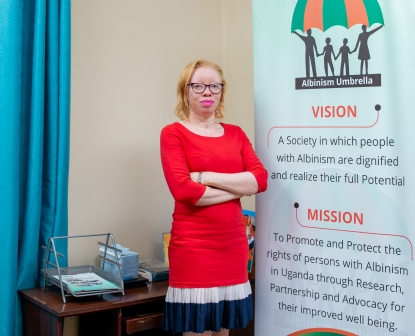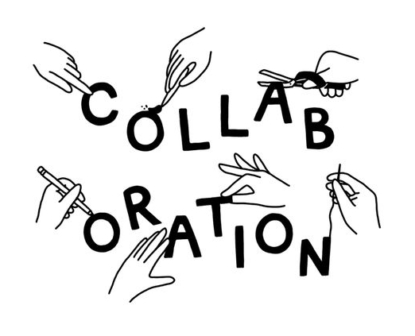Project
The Unknown about Albinism
-
Amount Funded
315,631 EUROProject Duration
01 Sep 2020 - 31 Mar 2025 -
-
Lead organisation
-
Albinism Umbrella (AU) exists as a voice that engages the community to reduce the vulnerability of people with albinism, promoting and protecting them against violation of their rights.
Their main programmes can be summarised in four broad categories, i.e. social justice, livelihood, health and security. Albinism Umbrella employs multiple approaches to achieve its objectives. They work through community-based organisations, seek support both locally and globally. Some of the underlying activities include the provision of sunscreens, counselling and guidance, legal aid support, and lobbying and advocacy.
Albinism Umbrella did a spatial mapping in 10 districts of Eastern Uganda which revealed that PWA are marginalised in service delivery due to various reasons like lack of data, limited awareness and negative prejudices. This research was a great accomplishment. They also pride in sending the first-ever PWA to work with Parliament of Uganda as a result of our advocacy work.
Albinism Umbrella is part of the national task force for the implementation of the Regional Action on albinism in Uganda. A national action plan for Uganda is underway to domesticate the regional action plan.
-
Organisation
Albinism Umbrella (AU) exists as a voice that engages the community to reduce the vulnerability of people with albinism, promoting and protecting them against violation of their rights.
Their main programmes can be summarised in four broad categories, i.e. social justice, livelihood, health and security. Albinism Umbrella employs multiple approaches to achieve its objectives. They work through community-based organisations, seek support both locally and globally. Some of the underlying activities include the provision of sunscreens, counselling and guidance, legal aid support, and lobbying and advocacy.
Albinism Umbrella did a spatial mapping in 10 districts of Eastern Uganda which revealed that PWA are marginalised in service delivery due to various reasons like lack of data, limited awareness and negative prejudices. This research was a great accomplishment. They also pride in sending the first-ever PWA to work with Parliament of Uganda as a result of our advocacy work.
Albinism Umbrella is part of the national task force for the implementation of the Regional Action on albinism in Uganda. A national action plan for Uganda is underway to domesticate the regional action plan.
-
Project
Design Phase (6 months)
The Unknown about albinism project profiles and maps households with Persons with Albinism in Northern, Western and Central Uganda as a basis for advocacy and access to services.
The project has the following specific objectives;
1. To create a comprehensive database for People with albinism in Northern, Western and Central Uganda.
2. To promote the formation of support groups of People with Albinism at grassroots levels as a basis for accessing health, education and other mainstream services.
3. To empower People with Albinism with advocacy skills through the support groups to enable them to lobby for their rights.
4. To influence national policy to enhance inclusion of People with Albinism in mainstream development based on the data collected.
The project increases visibility and recognition of albinism as a disabling condition and the support structures created facilitate advocacy access to services across the country. Ultimately the project empowers the albino community by increasing their self-esteem and confidence and enhancing opportunities for them to participate effectively in mainstream development processes in the country.
-
-
Design Phase (6 months)
The Unknown about albinism project profiles and maps households with Persons with Albinism in Northern, Western and Central Uganda as a basis for advocacy and access to services.
The project has the following specific objectives;
1. To create a comprehensive database for People with albinism in Northern, Western and Central Uganda.
2. To promote the formation of support groups of People with Albinism at grassroots levels as a basis for accessing health, education and other mainstream services.
3. To empower People with Albinism with advocacy skills through the support groups to enable them to lobby for their rights.
4. To influence national policy to enhance inclusion of People with Albinism in mainstream development based on the data collected.
The project increases visibility and recognition of albinism as a disabling condition and the support structures created facilitate advocacy access to services across the country. Ultimately the project empowers the albino community by increasing their self-esteem and confidence and enhancing opportunities for them to participate effectively in mainstream development processes in the country.
-
The Unknown About Albinism: Mapping for Inclusion and Advocacy in Uganda
For many years, persons with albinism in Uganda have faced discrimination, health risks, and limited access to essential services. Without reliable data on their population and needs, policymakers and service providers have struggled to design interventions that truly address their challenges. To bridge this gap, Albinism Umbrella, with support from Voice, launched The Unknown About Albinism project. This initiative sought to map and profile persons with albinism, collect credible data, and use it to drive policy change, healthcare access, and social inclusion.
At the heart of this project was the spatial mapping of albinism communities across Western, Central, and Northern Uganda. Using Global Positioning System (GPS) technology, the team successfully identified and profiled 507 persons with albinism (312 women, 197 men). This first-of-its-kind database provided critical evidence to advocate for inclusive policies and programs. As a direct result, the Ugandan government adopted the National Action Plan on Albinism, a groundbreaking framework that commits to the protection and empowerment of persons with albinism. Additionally, sustained advocacy efforts led to sunscreen being added to Uganda’s National List of Essential Medicines, a major win for health equity.
Beyond data collection, the project actively empowered persons with albinism to become self-advocates. Albinism Umbrella formed and trained five support groups, reaching 76 rights holders with capacity-building sessions in leadership, governance, and self-advocacy. Some of these groups successfully linked to government livelihood programs, improving their economic security. The project also facilitated global collaborations, with participation in Linking & Learning events that strengthened partnerships and enhanced advocacy efforts.
Lessons Learned: The Triumphs and the Challenges
While the project achieved significant milestones, the journey was not without obstacles. One of the biggest challenges was initial resistance from communities during the mapping process. Many persons with albinism and their families were hesitant to share information due to past experiences of discrimination and stigma. Overcoming this required trust-building efforts, community dialogues, and employing researchers with albinism, which significantly improved participation.
Another key lesson was the importance of government partnerships for sustainability. The success of the National Action Plan on Albinism and the sunscreen policy was made possible by early engagement with policymakers. However, implementation remains slow, with gaps in funding and service delivery. This highlights the need for continued advocacy and accountability mechanisms to ensure these policies translate into real impact on the ground.
The project also exposed gaps in public awareness about albinism. Despite advocacy efforts, harmful myths and misconceptions persist, influencing attitudes in schools, workplaces, and healthcare facilities. While awareness campaigns made progress, there is still a long road ahead to achieving true social inclusion. Moving forward, Albinism Umbrella plans to scale up community education programs and strengthen media engagement to change narratives around albinism.
Looking Ahead: Sustaining the Impact
The work does not stop here. With a strong foundation in data, advocacy, and community mobilization, Albinism Umbrella is now focused on expanding its impact. Plans are underway to:
- Develop a permanent database to track the needs and demographics of persons with albinism in Uganda.
- Support more albinism-led support groups, providing training and economic opportunities.
- Ensure full implementation of the National Action Plan on Albinism through continuous advocacy.
- Expand health outreach programs, increasing access to sunscreen, eye care, and protective gear.
This project has proven that data is power. By using evidence-based advocacy, the albinism community in Uganda has gained visibility, secured policy changes, and taken steps toward a more inclusive future. While challenges remain, the momentum is strong, and the movement for albinism rights is only growing stronger.
-
News





